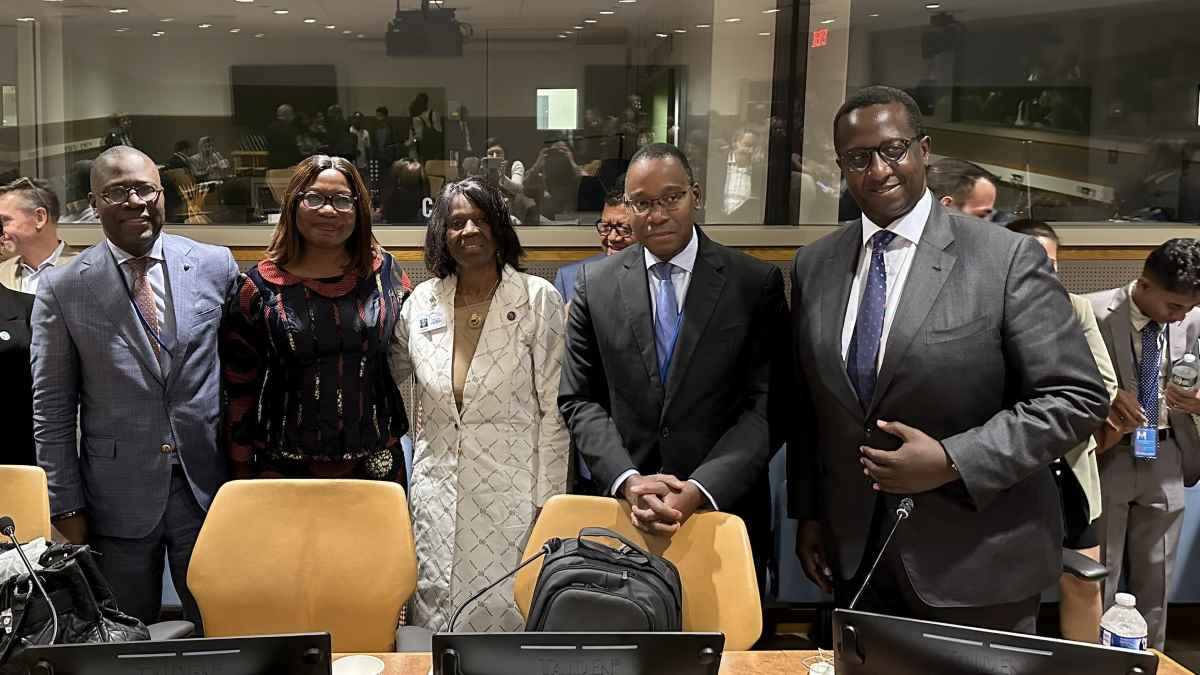Peace is achievable with the right blend of dialogue and peace positive investments
NEW YORK, United States of America, September 24, 2024/APO Group/ —
The African Development Bank (www.AfDB.org) has urged Development Finance Institutions (DFIs) and other development partners to scale up innovative partnerships and initiatives to build peace and security in Africa, home to eleven of the world’s most conflict-affected states.
Marie-Laure Akin-Olugbade, African Development Bank Vice-President for Regional Development, Integration and Business Delivery Complex led the charge during a session held September 21, on the sidelines of the 79th Assembly of the United Nations titled: Investing in Prevention: Scaling up Peace – A Call to Action for DFIs.
Over the last 20 years, the level of global conflict has escalated, with one-fifth of Africa’s population residing in conflict affected areas, affecting the future of the world’s fastest-growing continent.
“Our goal today is very clear. We would like to mobilise institutions to prioritise peace building and through innovative partnerships and new financial mechanisms. This is a call for action.” Akin-Olugbade said in opening remarks.
The New Agenda for Peace, which is at center stage of the UN’s Summit of the Future, highlights how different actors, including DFIs can serve as peace agents, and emphasises the role of partnerships, especially in the context of fragile and conflict affected countries, urging increased political and financial mobilisation to prevent conflicts.
The effect of three decades of a devastating civil war in Mozambique are still evident, Amilcar Tivane, Mozambique’s Vice-Minister of Economy and Finance told participants, stressing the need for prevention.
The Mozambique government has learned innovative solutions to deal with the root causes of conflict and to address lingering security challenges in northern Mozambique such as terrorism and insurgency. What has worked is a resilience building strategy together with partnerships, Tivane said. The country is also launching a new initiative for peace for the reconstruction of affected tourism areas
« We have learned that prevention is critical, » he said. « Sometimes its difficult (for governments) to acknowledge that the social dimensions could have a significant impact.»
Issa Faye, Director General of the Islamic Development Bank ( IsDB) said his institution’s blend of ordinary and concessional financing has been key to the successful financial support for 32 fragile African countries out of the 52 they support.
The IsDB have aided thousands of refugees through programmes to address skills gap, training and education, combining economic empowerment and food security.
Faye underlined Islamic financing as a concept framing a lot of the institution’s programmes and stressed the need to find alternative financing which is dedicated, responsive and resilient.
We would like to mobilise institutions to prioritise peace building and through innovative partnerships and new financial mechanisms
Risk perception, another major constraint to financing peace initiatives in Africa, was the subject of Pradeep Kurukulasuriya, the Executive Secretary of the UN Capital Development Fund (UN CDF), submission. He offered a concrete example of successful de-risking of a peace initiative in Burundi.
« UN DCRF works to de-risk so that larger streams of finance can flow from the larger and more established institutions, » he said.
Since 2021, UNCDF has been working in collaboration with the UN Peacebuilding Fund and the Government of Burundi to address interconnected and transnational root-causes of instability and nature loss in the Kibara National Park and surrounding buffer zones. The joint initiative with several partners including UNESCO, uses a unique blended finance approach.
Peace finance needs new a lens
Itonde Kakoma, President of Interpeace said a new paradigm approach, which moved away from the donor focus and instead sees development partners investing in peace investment hubs and creating a pipeline of peace positive projects, is much needed.
He said the need to connect development finance and peace building while leveraging the private sector to build peace, safety and social cohesion between communities living in complex environments, was more imperative than ever.
« We have a conviction that the Sustainable Development Goals can be unlocked by peace finance, » Kakoma said.
Other participants such as Elizabeth Spehar, Assistant Secretary General, United Nations Peacebuilding Support stressed the importance of inclusion and the role of DFI’s such as the African Development Bank.
“We need the economic might of the DFI’s. We have to work on this together,” she said.
Spehar paid tribute to the African Development Bank which emphasizes peace and security as public goods in its new Ten-year strategy (2024-2033). The Bank’s joint pilot project in Central African Republic with UNHCR has the UN “working with communities on the peace part and the African Development Bank working on the employment part,” Spehar said.
The Bank has been on the forefront of systematically addressing issues of fragility in Africa and has built up over 20 years of experience in building Africa’s resilience by providing intellectual leadership and dedicated financial instruments, such as the Transition Support Facility, which mobilizes additional resources for affected countries. The Bank’s Private Sector Credit Enhancement Facility allows it to do more private investments in these riskier markets.
The audience also heard from the g7+, Asian Development Bank, Civil Society Platform for Peacebuilding and Statebuilding (CSPPS), the World Economic Forum (WEF), the Aswan Forum, UNHCR, and the African Union Peace Fund whose Director Dagmawit Moges spoke of the institution’s reforms and the importance of governance.
“We’ve gone beyond theory and talk. We at the African Development Bank are interested in strengthening partnerships. We are not going to work in silos. We are looking forward to continuing this discussion at COP 29 and at the Africa Resilience Forum next year,” Akin-Olugbade said.
Distributed by APO Group on behalf of African Development Bank Group (AfDB).


 Energy5 days ago
Energy5 days ago
 Business5 days ago
Business5 days ago
 Energy3 days ago
Energy3 days ago
 Business3 days ago
Business3 days ago
 Business3 days ago
Business3 days ago
 Energy2 days ago
Energy2 days ago
 Business3 days ago
Business3 days ago
 Energy2 days ago
Energy2 days ago












